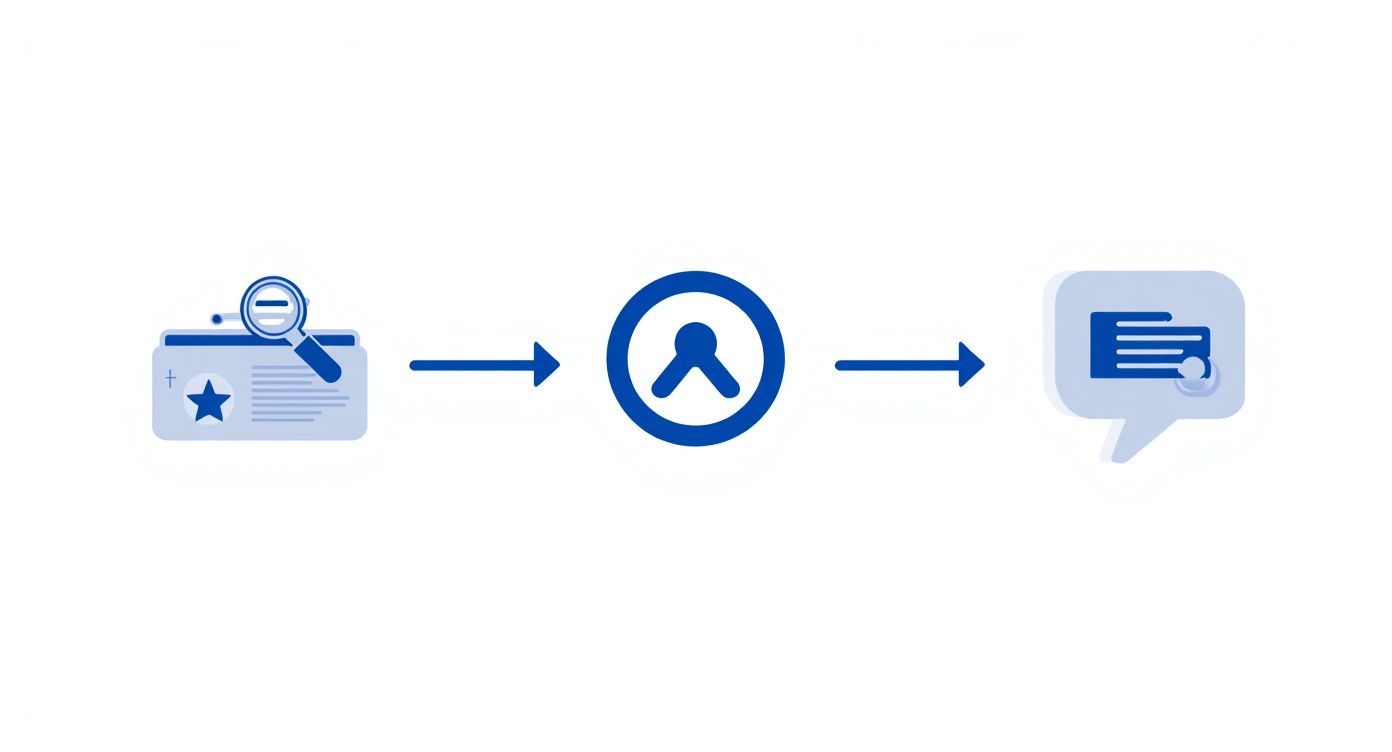
Think of your brand's reputation as its digital storefront. Every review, article, and social media mention adds to the display, influencing whether potential customers decide to walk in or walk away. A reputation management consulting firm is the expert architect and security guard for that storefront, working tirelessly to make sure it looks its best.
Their whole job is to ensure that what people find when they search for you online is an accurate, positive, and trustworthy reflection of your business.
What Is Reputation Management Consulting

This isn't just a fancy term for PR or marketing. It's a highly specialized field focused entirely on shaping the narrative about your brand online. The work generally falls into two distinct, yet interconnected, modes: playing offense and playing defense.
The Two Core Functions of Reputation Management
First, there’s the proactive work—this is all about building a strong digital immune system for your brand. A consultant focuses on creating a fortress of positive assets that makes your online presence resilient to attack. This usually involves:
- Encouraging a steady stream of authentic, positive reviews on the platforms that matter most.
- Creating and sharing high-quality content that showcases your expertise and company values.
- Keeping a close watch on online conversations to understand public sentiment and engage where it makes sense.
Then you have the reactive side—the crisis control. This is the emergency response team you call when a fire starts. A damaging news story, a customer complaint that goes viral, or a sudden flood of fake reviews can cripple a business practically overnight. In these moments, consultants jump in with targeted strategies to contain the damage, correct the record, and start rebuilding trust.
At its core, reputation management consulting is the art and science of aligning public perception with brand reality. It ensures the story told about you online is the one you want your customers to hear and believe.
These two approaches, proactive and reactive, are two sides of the same coin. Here’s a quick breakdown of how they differ in practice.
Proactive vs Reactive Reputation Management
| Aspect | Proactive Management (Building Resilience) | Reactive Management (Crisis Control) |
|---|---|---|
| Goal | To build a strong, positive online presence that can withstand negative events. | To minimize damage from a specific negative event or crisis. |
| Activities | Content creation, review generation, SEO, social media monitoring, brand building. | Crisis communications, review removal, legal action, search result suppression. |
| Timing | Ongoing, long-term strategy implemented before any problems arise. | Short-term, intensive response triggered by a negative incident. |
Ultimately, a good strategy blends both. The proactive work lessens the need for reactive measures, and a solid reactive plan ensures you’re ready for anything.
A Necessity In A Digital-First World
The need for this kind of service has exploded. The global reputation management services market is on track to hit a valuation of around $2.4 billion in the coming years, with much of that growth happening right here in North America. This isn't just a trend; it's a direct response to how much power online information now holds over whether a customer chooses you or a competitor.
Working with a specialist helps you take back control of your digital identity. It's no longer a luxury reserved for massive corporations but a fundamental need for any business serious about its customer relationships and long-term success.
To learn more about the fundamentals, check out our complete online reputation management guide. For a deeper look into the consulting process itself, this article on reputation management consulting is a great resource.
What Reputation Management Consultants Actually Do
When you hire a reputation management consultant, you're not just getting advice—you're getting a team on the ground, actively shaping, defending, and repairing your brand’s digital footprint. Think of them as your digital guardians, deploying a whole arsenal of services to manage how you're seen online.
These services aren't just a random checklist of tasks. They're all connected, working together to build a strong, positive, and resilient online identity. Let's pull back the curtain and look at the core services that make up a real-world reputation strategy.
Online Review Management
Let's face it: online reviews have become the new word-of-mouth, and they pack a serious punch. With 83% of customers needing to trust a brand before they'll even consider buying, reviews are often the first—and last—place they look.
Managing reviews is so much more than just glancing at your star rating. A consultant gets deep in the trenches to:
- Monitor Everything: They use sophisticated tools to keep an eye on reviews across dozens of sites, from the big players like Google and Yelp to the niche forums specific to your industry. Nothing slips through the cracks.
- Respond with a Plan: They don't just fire off generic replies. They craft thoughtful, professional, and on-brand responses to both glowing praise and harsh criticism, showing everyone that you’re listening and you care.
- Encourage the Good Stuff: A huge part of the job is proactively building a base of positive feedback. This involves implementing proven strategies for getting more Google reviews to create a powerful buffer of positive sentiment that can weather the occasional negative comment.
Handled correctly, your review profiles stop being a source of anxiety and become a powerhouse for building credibility and winning over new customers.
Reputation SEO and Content Strategy
Go ahead, Google your own brand. What shows up on that first page? Reputation SEO is all about making sure the answer is overwhelmingly positive and controlled by you. It’s a defensive game, designed to push down negative articles, old news, or nasty forum threads by outranking them with good content.
This isn’t your typical marketing SEO. We’re not trying to rank for "buy widgets." We're focused on controlling the conversation around your brand name.
The goal is simple: make the good stuff easy to find and the bad stuff hard to find. It’s like building a digital "firewall" of high-quality, positive content that shoves any damaging material off the first page of Google, where it's far less likely to be seen.
How do they do it? By creating and promoting a mix of powerful digital assets, like:
- Optimized blog posts that showcase your company's expertise and values.
- Positive press releases and media features.
- Polished executive bios on sites like LinkedIn.
- Active, engaging social media profiles that show off your brand's human side.
By building this library of positive assets, consultants give you back control of your own story.
Social Media Monitoring and Sentiment Analysis
Social media never sleeps. It's a massive, real-time conversation about your brand, and you absolutely have to be tuned in. Consultants use powerful listening tools to track every mention of your brand, your key people, and your competitors across platforms like X (formerly Twitter), Facebook, and Reddit.
But this goes way beyond just counting likes and shares. The real magic is in sentiment analysis—understanding the feeling behind the chatter. Is that spike in mentions because people love your new feature, or is a customer service complaint starting to catch fire?
Catching a negative trend early is everything. By spotting a problem before it goes viral, a consultant can jump in, address the concern, and stop a small brush fire from turning into a full-blown inferno.
Crisis Communication Planning
Even with the best proactive strategy, things can go wrong. A product gets recalled, a data breach happens, or an employee's angry post goes viral. When a crisis hits, you need a clear, calm, and coordinated response—not panic.
This is where a reputation management consulting firm really earns its keep. They work with you to build a comprehensive crisis communication plan before you ever need it.
Think of it as your brand's emergency playbook. It clearly outlines:
- The Response Team: Who’s on point when a crisis hits (legal, PR, executives).
- The Lines of Communication: How information flows internally and who speaks for the company.
- Ready-to-Go Messaging: Pre-drafted statements for different scenarios so you can respond in minutes, not hours.
- The Right Channels: Deciding where to communicate—a press release, a social media update, or a banner on your website.
Having this plan on the shelf means you can react with confidence and control, minimizing the damage and starting the process of rebuilding trust right away.
How a Consulting Engagement Actually Works
Bringing in a reputation management consultant might seem like a major move, but the process is surprisingly straightforward and collaborative. Think of it less like an emergency call and more like a specialist performing a full diagnostic on your brand's digital health before prescribing a personalized treatment plan.
The whole engagement is built on transparency. It moves through distinct, logical phases, from the initial deep dive to long-term care, so you always know what's happening, why we're doing it, and what to expect.
Phase 1: The Initial Reputation Audit
First things first, we need to know exactly where you stand. The consultant kicks things off with an exhaustive audit, using sophisticated tools to scan the web for every mention of your brand, key people, and products. This goes way beyond a quick Google search; it's a forensic-level analysis of your entire digital footprint.
They'll dig into:
- Search Engine Results: What really shows up on the first few pages when people search for you?
- Review Platforms: What's the consensus on sites like Google, Yelp, and other industry-specific review hubs? We're talking sentiment, star ratings, and recurring themes.
- Social Media Channels: What are people actually saying about you on everything from X (formerly Twitter) to Reddit? This includes customers, competitors, and influencers.
- News and Media Mentions: How are you being framed in news articles, press releases, and blog posts across the web?
This audit becomes our baseline. It shines a light on your strengths, weaknesses, threats, and opportunities, giving us the hard data we need to build a strategy that tackles your specific challenges head-on.
Phase 2: Strategy Development and Goal Setting
Once we have a clear picture of your online reputation, it's time to build a custom strategy. This is never a one-size-fits-all situation. The consultant will work closely with you to set clear, measurable goals that align with what your business is trying to achieve.
For example, a law firm’s top priority might be to push down a damaging news article from a few years ago. An e-commerce brand, on the other hand, might be laser-focused on lifting its average star rating from 3.8 to 4.5.
The strategy is our roadmap for the entire project. It details the exact tactics we’ll use, sets realistic timelines, and establishes the key performance indicators (KPIs) we'll use to track our progress and measure success.
Phase 3: Hands-On Implementation
This is where the rubber meets the road. The implementation phase is all about executing the strategic plan we’ve built together. Depending on your specific needs, the consultant's team will get to work on a wide range of tasks.
The infographic below breaks down the core pillars that are often the foundation of any solid reputation management campaign.

As you can see, it's not about doing one thing well. It's about how managing reviews, shaping search results, and staying on top of social media all work together as part of a single, cohesive strategy.
Phase 4: Ongoing Monitoring and Reporting
Your online reputation isn't something you can "fix" and then forget about. It needs constant cultivation and defense. Once the initial work is underway, the focus shifts to vigilant monitoring and transparent reporting. Consultants use powerful dashboards to track every metric against the KPIs we agreed on.
You can expect regular, easy-to-understand reports that show you exactly what's going on:
- Sentiment Trends: Is the general conversation about your brand getting more positive over time?
- Search Ranking Changes: Are the positive websites and articles we're promoting climbing higher in Google's search results?
- Review Volume and Ratings: Are you getting more positive reviews, and is your overall star rating improving?
This data-driven cycle keeps everyone accountable and allows for quick adjustments to the strategy, ensuring your brand's reputation stays strong and healthy for the long haul.
The Tech Powering Modern Reputation Management

Not too long ago, managing a brand's reputation was a game of public relations chess, played with careful messaging and strategic content. Today, it's a high-tech operation, supercharged by software that sifts through the digital world at a scale that was once pure science fiction. The engines driving this change are artificial intelligence (AI) and machine learning (ML).
These tools have completely flipped the script on reputation management consulting. What used to be a reactive, manual slog has become a predictive, highly automated discipline. Instead of scrambling to put out a fire, consultants can now spot the smoke long before the flames appear.
From Manual Monitoring to Predictive Insights
Think back to the old way of doing things. Monitoring a brand’s reputation meant hiring teams to manually scour the internet for mentions, painstakingly reading through comments one by one. It was slow, wildly expensive, and almost guaranteed to miss critical chatter bubbling up in some corner of the web.
AI-powered platforms have blown that model out of the water. They can scan millions of data points—social media posts, news articles, forum rants, customer reviews—in the blink of an eye. But they don't just collect mentions; they understand them.
AI-driven sentiment analysis is a perfect example. It can instantly read the emotional tone of a conversation, flagging it as positive, negative, or neutral. This gives a consultant a real-time, data-backed pulse check on public opinion.
This speed allows firms to deliver recommendations based on solid evidence, not just gut feelings, whether they're trying to head off a crisis or get ahead with a proactive campaign.
How AI Detects Emerging Crises
The real magic of this technology is its ability to spot patterns a human analyst would almost certainly overlook. It’s like having a sophisticated early-warning system that’s always on, always watching.
Here’s a look at how it works on the ground:
- Anomaly Detection: The software first learns what "normal" online conversation about your brand looks like. It then sounds the alarm at any sudden spike in negative mentions or a shift in sentiment, alerting the team to a potential problem before it goes viral.
- Trend Identification: AI can connect the dots between seemingly random negative comments across different platforms. It might notice a recurring complaint about a product flaw or a shipping delay that points to a bigger, systemic issue.
- Influencer Mapping: The tools can also pinpoint the key accounts or individuals driving a negative conversation, which allows for a much more focused and effective response.
Armed with this technology, consultants can stop just reacting to yesterday's problems and start proactively shaping tomorrow's conversation. This data-first approach takes the guesswork out of the equation.
This shift toward intelligent automation is why so many businesses now rely on specialists. Having the right tools is non-negotiable, and knowing the ins and outs of the best online reputation management software is a cornerstone of any good consulting partnership. It's the perfect blend of human expertise and machine precision, all working to protect a brand's most valuable asset: its reputation.
How to Choose the Right Consulting Firm
Picking a partner for reputation management is a serious decision. Think of it like hiring a top lawyer or a CFO—you’re handing them the keys to one of your company's most precious assets. The market is crowded, but finding the right fit isn't about choosing the biggest agency. It's about finding a strategic partner who truly gets your specific problems and works with integrity.
This choice is even more important when you realize how the industry is set up. In the United States alone, management consulting is a massive $407.3 billion industry. What's surprising is that nearly 82.7% of these consultants are self-employed. This means the field is full of specialized solo experts and boutique agencies, making a thorough vetting process absolutely essential. You can dig deeper into these industry stats over at IBISWorld.com.
H3: Look for Real Experience and a Niche
Reputation management isn’t a one-size-fits-all game. A law firm trying to correct a misleading news story has a completely different set of needs than an e-commerce brand fighting off counterfeiters. If a firm offers a cookie-cutter solution, that’s a huge red flag.
You need a team with a proven track record in your industry. They should already know the lingo, understand the platforms where your audience hangs out, and be aware of the unique ethical or compliance lines you can't cross. For example, a consultant who specializes in healthcare will be an expert on HIPAA regulations, a critical detail a generalist might completely miss.
H3: Demand Full Transparency on Methods
Let's be honest: the reputation management world has its share of shady operators. Some promise miracle cures using "black hat" tactics like posting fake positive reviews or using sketchy SEO tricks. These shortcuts almost always backfire, leading to penalties from platforms like Google and creating an even bigger PR mess.
A trustworthy firm will be an open book. They should be able to walk you through their entire process, explaining exactly how they plan to promote positive content and handle negative items. If a potential partner gets cagey, is secretive about their methods, or makes promises that sound too good to be true, you should walk away. Fast.
Ethical reputation management isn't about erasing the truth. It's about making sure the full, positive truth is more visible than the misleading or false narratives. A great consultant builds and defends; they don't hide and deceive.
H3: Key Questions to Ask Any Potential Consultant
To cut through the sales pitch and find a truly capable partner, you need to ask the right questions. A good consultant will not only have answers but will welcome your diligence.
- Strategy and Tactics: Can you walk me through the specific strategy you’d recommend for our situation? What methods do you use to suppress negative content, and do they comply with platform terms of service?
- Success Metrics: How do you actually define success for a campaign like this? What key performance indicators (KPIs) will you track, and how often can we expect a report?
- Experience: Can you share case studies or examples of work you’ve done for other clients in our industry who faced similar challenges?
- Ethics and Compliance: What is your ethical code? How do you guarantee your work is always above board and won't put our brand at risk?
- Communication: Who will be my day-to-day contact? What’s your protocol if an urgent crisis pops up after hours?
H3: Understand the Pricing Models
Finally, you need to get a handle on how a firm structures its fees. Understanding their pricing helps you align your budget with the actual work being done. Most reputation consultants use one of three common models.
A clear understanding of these pricing structures will help you compare apples to apples when evaluating different firms.
Comparing Reputation Management Pricing Models
A breakdown of common pricing structures to help businesses understand costs and choose the best option for their budget and needs.
| Pricing Model | Best For | Typical Cost Structure | Key Consideration |
|---|---|---|---|
| Monthly Retainer | Ongoing, proactive reputation management and monitoring. | A fixed fee paid monthly for a defined set of services. | Ensures continuous support but requires a longer-term budget commitment. |
| Project-Based Fee | A specific, one-time issue, like a crisis or a new product launch. | A flat, one-time fee agreed upon for a clear scope of work. | Great for defined problems, but out-of-scope work will cost extra. |
| Hourly Rate | Initial audits, strategic consultations, or small, specific tasks. | An hourly fee for time spent, billed as work is completed. | Flexible for small jobs but can be unpredictable for larger campaigns. |
Choosing the right firm is about more than just finding someone with the right skills. It's about finding an expert who operates with transparency and integrity—someone who feels like a true extension of your own team.
Measuring the ROI of Your Reputation Efforts
Putting money into reputation management feels like the right thing to do, but how do you know it’s actually working? It's easy to get stuck on vague ideas like "brand health." A seasoned consultant, however, will anchor everything they do in hard data, showing you exactly how their work connects to your bottom line.
This isn't about wishful thinking. It's about tracking specific Key Performance Indicators (KPIs) that tie reputation work directly to business success. Think of it as a fitness tracker for your brand's public image. Instead of steps and heart rate, you’re monitoring digital vital signs that prove things are moving in the right direction.
Key Metrics That Prove Value
Any good consultant will build you a custom performance dashboard. This isn't just a fancy report; it's a clear, data-driven story of your campaign's progress. While the exact KPIs will depend on your specific goals, most campaigns boil down to a core set of tangible outcomes.
You should expect to see metrics like these:
- Search Engine Rankings: Where do your positive assets—like your website or great press—show up when someone searches for your brand? The goal is simple: own the first page of Google.
- Sentiment Analysis: What's the general feeling of the online conversation about you? We're looking for a measurable shift from negative or neutral chatter to a more positive tone.
- Visibility of Negative Content: How far down have we pushed that nasty article or bad review? Moving a damaging link from page one to page three is a huge victory, effectively making it invisible to most people.
- Review Volume and Ratings: Are you getting more positive reviews? Is your average star rating on critical sites like Google and industry-specific platforms climbing?
A strong reputation, built on trust and credibility, directly influences revenue. When customers trust your brand, they are more likely to choose you, even if competitors are cheaper. This trust translates into repeat business and powerful word-of-mouth marketing.
Connecting Reputation to Business Goals
At the end of the day, this all has to connect back to real business results. An experienced consultant will help you draw a straight line from their efforts to your company's core objectives, showing how a cleaner search profile and better online sentiment lead to tangible gains.
The connection becomes obvious when you start looking at business metrics such as:
- Lead Generation and Conversion Rates: It's no secret that better reviews and a positive search presence drive higher-quality leads that are easier to close. Research has shown that even a single negative result can scare off a huge chunk of potential customers.
- Customer Trust and Loyalty: You can track metrics like your Net Promoter Score (NPS) right alongside a reputation campaign. As your online image improves, you'll often see a corresponding lift in customer loyalty and their willingness to recommend you.
- Talent Acquisition: Your public reputation isn't just for customers. Top candidates absolutely research a company's reputation before they even think about applying. A positive employer brand makes it faster and cheaper to attract the best people.
When you focus on these data points, reputation management consulting stops feeling like an expense and starts looking like a strategic investment. It gives you undeniable proof that managing your digital presence is one of the smartest ways to build trust, drive sales, and secure your company's future.
Frequently Asked Questions About Reputation Consulting
Diving into the world of reputation management often brings up a ton of questions. It's a niche field, after all, and you need to know what you're getting into before signing on the dotted line. Let's walk through some of the most common things business owners ask, so you can have a clear picture of what to expect.
How Long Does It Take to See Results?
This is the big one, and the honest-to-goodness answer is: it really depends. The timeline is completely tied to the problem you're trying to solve.
If your goal is relatively straightforward—say, you just want to get more positive reviews coming in—you could start seeing a difference in just a few months. But if you're up against a tougher challenge, like trying to bury a negative news article from a major publication, that’s a marathon, not a sprint. Search engines don't change their minds overnight; they need to see a consistent pattern of new, positive information over time.
For significant, lasting changes in search results, a realistic timeframe is usually somewhere between 6 to 12 months. It’s all about consistent, strategic effort. Quick fixes rarely stick.
Can Negative Content Actually Be Deleted Forever?
Everyone wishes for a magic "delete" button, but permanent removal is pretty rare. It's really only on the table if the content clearly violates a website's rules or breaks the law—think things like outright defamation or copyright infringement. A consultant knows how to file these claims, but no platform is required to take down content that is legally protected speech, no matter how much you dislike it.
When removal is off the table, the game plan shifts to suppression. The idea is to create a flood of high-quality, positive content that pushes the negative stuff so far down in the search results that no one ever finds it. It becomes practically invisible.
Isn't This Just the Same as Public Relations?
It’s easy to see why people mix them up, but PR and reputation management play on different parts of the field.
Here’s a simple way to think about it:
- Public Relations (PR) is about proactively shaping your story. It’s about getting your name out there in a positive light through things like press releases, media interviews, and events.
- Reputation Management Consulting is more of a defensive and corrective play. It deals with the digital footprint you already have—the good, the bad, and the ugly—and works to clean it up and shape the narrative that people find online, especially on Google and review sites.
So, PR writes the story, and reputation management protects it from getting hijacked online.
What Should I Do if a Crisis Hits Right Now?
When a crisis erupts—a video goes viral for the wrong reasons, a damaging story breaks, or a product gets recalled—the first few hours are absolutely critical. Your gut reaction might be to fight back or hide, but that can pour gasoline on the fire.
Here's what to do immediately:
- Pause. Don't Panic. And Don't Delete. A knee-jerk reaction like scrubbing negative comments almost always backfires and makes you look guilty.
- Get Your Facts Straight. Pull your team together and figure out exactly what happened. No assumptions.
- Call in an Expert. This is precisely when you bring in a reputation management consulting firm. They've been through this before and can guide you through the storm without making things worse.
A good consultant will help you craft a measured, strategic response that acknowledges the problem, shows you’re taking it seriously, and starts the long process of earning back your customers' trust.
